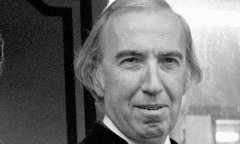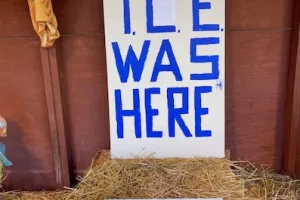Thankgiving Service for life of Lord St John of Fawsley

Lord St John of Fawsley
Warm tributes were paid to The Rt Hon Lord St John of Fawsley, at a Service of Thanksgiving to celebrate his life and work, in St Margaret’s Church, Westminster Abbey yesterday.
Representatives of the Royal Family, Parliamentarians, civic dignitaries, Church leaders and other clergy, family, friends and representatives of the media gathered for the service which was conducted by The Rev Andrew Tremlett, Canon of Westminster and rector of St Margaret's Church. The service was sung by the Choir of St Margarets, conducted bt Aiden Oliver.
Lord St John of Fawsley, the former Conservative MP Norman St John-Stevas, died on 2 March 2012 aged 82.
In the Opening Prayer, the Rector outlined Lord Fawsley's life: "the flamboyant politician, academic and barrister. His early flair showed itslef when as a boy, he tackled Communist speakers in Hyde Park. A stellar academic career flourished both here and in the United States, not to mention his life as a journalist on the Economist. In 1964 the draw of public life led to the safe Conservative seat of Chelsmford which St John-Stevas held for 23 years. Ministerial posts followed, culminating in his appointment as Minister of State for the Arts and Leader of the House of Commons, an impressive legacy of which is the Slelect Committee system so prominent today. His swift exit from the Thatcher Cabinet in 1981 opened up new paths for his creative energies, as Chairman of the Royal Fine Arts Commission, and as Master of Emmanuel College to name but two. Enobled as Lord St John of Fawsley, there was throughout his life tehe golden thread of Christian faith practiced in the Catholic Church wich coloured and enriched all that he did. As we remember his lifelong companion Adrian Stanford and all who care for Lord St John, we join our prayers in the words of General Thanksgiving.."
In his address, Lord Lamont praised Lord Fawsley's achievements, personality and sense of humour, describing him as a 'Grade One human being. He had nicknames for many people - describing Mrs Thatcher as 'The Blessed One'. When someone accused him of name-dropping - he replied "yes the Queen said that to me the other day."
Lord Lamont said that beneath his flamboyant exterior Lord St John was a many of strong faith and integrity.
In his tribute, Cardinal Cormac Murphy O'Connor said: "I first met Norman St John-Stevas over 40 years ago when I was Rector of the Venerable English College in Rome, a seminary for training priests where, indeed, Norman himself had studied for a short time. When he was in Rome, which was often, he used to visit the college and was always looking for objets d’art. On one occasion his eye lit on a rather precious bust of Pope Pius IX – Pio Nono – and asked could he have it. I said, ‘No’, but he burst out, ‘Please - of course you must. I tell you what I will give you in exchange. You will have all my volumes on the work and life of Walter Bagehot’. Deep down, I did not think it was a very fair exchange – I still haven’t read them - but I gave it to him and it will come back to
the college in due course.
We have just heard a quotation from Norman’s book, The Two Cities. The title is, of course, a reference to St Augustine’s City of God, in which Augustine said, “Two loves have created two cities: love of self to the contempt of God, the earthly city; love of God to the contempt of self, the heavenly city. Norman did not see the two cities as opposites but rather, he said, “I see them as breathing together, a true conspiratio, one penetrating the other and resting on the same base – the love of God”.
It is not my place to comment too much on the earthly city - Norman’s brilliant career in Cambridge, in Oxford, in the Media, the Arts – his achievements and disappointments – his pride in being a Tory, his love and respect for the Royal Family. He loved politics and was for a short period an excellent Minister of the Arts and of Education. I cannot think of Norman without referring to his sense of fun. In politics he enjoyed recounting an occasion when he was a ‘rising star’ and Mr Heath was Prime Minister. He had had a clash with him about appearing in a
television programme and a message had gone saying he should not appear. But, of course, he did appear and when he met the Prime Minister in the lobby he said to him, “I hope that disagreement about the television programme is water under the bridge?” Ted Heath gave an astringent reply, “No, not water under the bridge,
promotion down the drain”. In fact he was promoted and was a very popular Member of both Houses.
But I would like to refer now to the other city called by St. Augustine, The Heavenly City. Norman was a very devout Catholic, not uncritical of the Church but always loyal, a very public apologist for many of its teachings, in particular, for the rights of the unborn. He also, soon after the Second Vatican Council, became part of a group called, New Bearings, which was a committee set up to help priests and religious who had run into difficulties and wished to leave their ministry. In a kind and constructive way he helped them with advice and finance enabling them to pursue another path in their lives.
It was St Benedict who wrote, fifteen hundred years ago that, laborare est orare ‘to work is to pray’. Norman took that to heart and his interior life of prayer and devotion was quite exemplary. He had a chapel in his house which was not a mere ornament but rather a place where he would sit and be quiet with God, giving him praise. Norman thought that society was suffering from spiritual under-nourishment which can only be alleviated by a core hidden life of prayer and devotion. He was well aware of his own frailty and saw in the Person of Jesus Christ a glimpse of God’s universal mercy shown in His stretching out to sinners and His willingness to embrace social and religious outcasts and His indifference to the past of individuals provided they turned to the Father.
He knew and wrote: 'God is Beauty as well as Truth. We see Him', he said,'in the highest aesthetic achievements of man in the arts, in music, in architecture; we see Him in nature, the garment of the Creator; in sunrise and sunset; in the oceans and in the evening star. We see Him above all in the triumphs of the human spirit, in the self-surrendering, self-sacrificial, unselfish love which has marked out some people in all ages in the love and friendship which we ourselves experienced.'
It is important for me to recall today that as well as being loyal to his own Church and accepting her claims, he was very drawn to other churches and especially to the Church of England with her beauty, her order and her holiness. He, like so many of us, found spiritual enlightenment from Christians outside our own community which helped him on the path of Christian life. He liked to quote Pope John XXIII who said, at the Second Vatican Council, We do not intend to conduct a trial of the past. We do not want to prove who was right and who was wrong. All we want to say is, Let us come together. Let us make an end of our divisions. That’s an ongoing task for all of us Christians and Norman, I think, played a significant part in that.
I cannot conclude without again mentioning Norman’s wit and sense of fun which persisted to the very end of his life. I went to see him a fortnight before he died and there he was, weak and accepting the last Rites of the Church humbly and happily. But two days before he died, a Nun who was a friend of his and who looks after elderly priests in the Westminster Diocese, went to bring him Communion. And after giving him Communion she got ready to go. Forgetting he wasn’t a priest, she said, 'Good-bye, Father' and Norman opened one eye and whispered, 'Sister, please, Monsignor – I’ve been promoted'.
So we remember Norman St John-Stevas today with admiration and affection. We give thanks to God for the good things and the joy that he brought to so many people. Norman’s life was, like all our lives, full of disappointments and failures but also great fulfilment and joy. It was another lawyer, Thomas More, who said, 'We may not expect to go to heaven in feather beds. It is not the way. Our Lord himself went thither through much pain and tribulation. May we his servants expect more than our Master.'
May Norman, His servant, now enjoy the fullness of life in that eternal City of God which is beyond all our understanding. Eternal rest give unto him, O Lord, and let perpetual light shine upon him. May he rest in peace."















